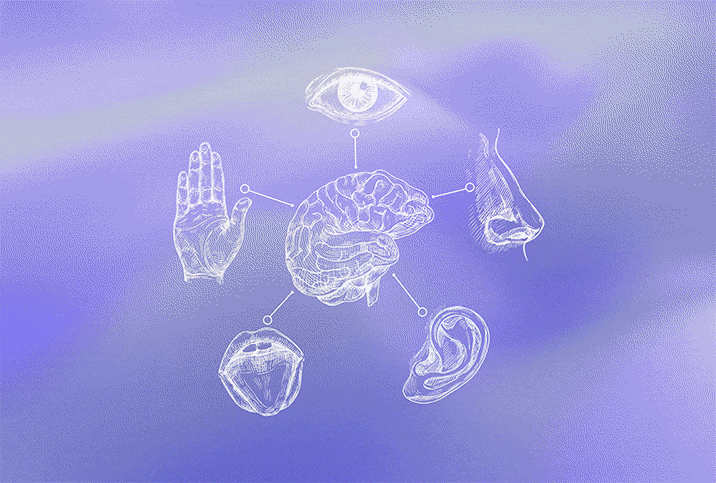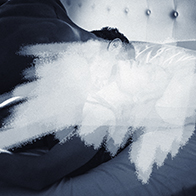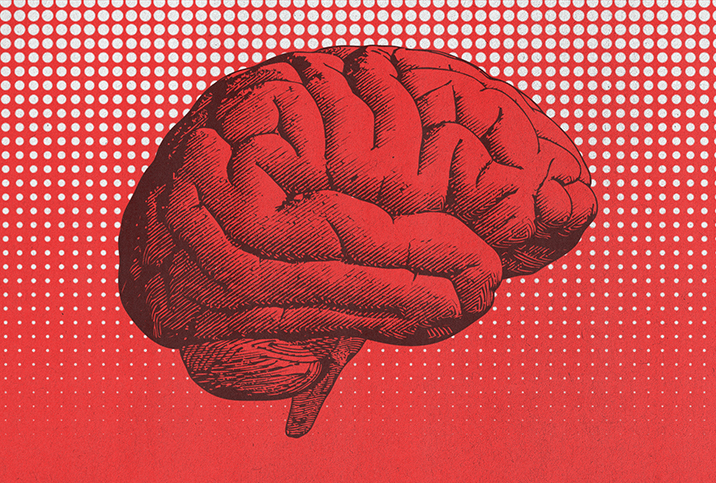What Is Sensory Memory and Why Is It So Important?

Every second of your life, you're storing information through your sensory receptors, a medical description for your five senses: hearing, sight, smell, taste and touch. All of this perceived information is processed by the nervous system, and snap decisions are made to move that memory to your short-term memory or to discard it when replaced by updated sensory memories.
Without these sensory memories, you would not be able to create new short- or long-term memories. Sensory memories also keep you in the moment, especially for anyone who has an interest in tactic sex, a slow and meditative type of sex where the sexual sensations of your body are more important than orgasm. But more on that later…
Three types of sensory memory
As the first stage of the memory process, sensory memory can then be transferred to short-term memory. However, in most cases, the information is quickly lost.
While sensory memory may be brief, it plays a vital role in our immediate attention and our ability to absorb information and interact instantly with the world around us. Sensory memory allows us to retain brief impressions of a vast amount of information.
"It appears to be a very short-lasting snippet in time that allows us to preserve that information long enough to pass it on if it's deemed to be important enough to maintain," said Matthew Reysen, Ph.D., an associate professor of psychology at the University of Mississippi. "If not, it just degrades and then it's gone."
The three main types of sensory memory to have been studied extensively are iconic, echoic and haptic.
Iconic memory stores visual images after the stimulus has ceased. Information stored in iconic memory disappears quickly. An example of iconic memory would be seeing a dog in a park.
"Iconic is the shortest," Reysen explained. "They last for about 350 milliseconds, a quarter of a second, and then they're gone."
Echoic memory involves a very brief memory of sound, comparable to an echo. This type of sensory memory can last for up to four seconds. An example of echoic memory would be hearing the horn of a vehicle.
Haptic memory involves the very brief memory of touch. This type lasts for about two seconds. An example of haptic memory is feeling a key while typing on a computer keyboard.
How you deal with so much incoming information
Sensory memory may enhance perception by smoothing the transition between visual images by very briefly retaining details of a preceding image. Reysen gave the example of graphical interchange format—GIFs—to illustrate this point.
"If you show still images at a rate that is presented fast enough, it's perceived as fluid motion," he said. "That could be one purpose of allowing us to take snippets of information and piece them together into something that's more coherent."
Reysen noted there is evidence to suggest people who have had damage to their auditory sensory memory system (echoic) can experience difficulties understanding spoken language.
"Maybe there is something important about being able to store a brief snippet of sound and connect it to the next one and just pass that information along into the short term, where we can maintain it a little bit longer and be able to focus on the meaning of the information," he added.
Reysen said forgetting is probably a good thing, because we're constantly inundated with so much information, it would be overwhelming if we were to remember everything we took in through our senses.
While sensory memories typically degrade over the course of a few seconds, there's also a phenomenon known as "masking": When you present a new stimulus right after the first stimulus, the new one takes the place of the old one in the sensory memory system.
"There's no way you could have all these things stacked up on each other," Reysen said. "As soon as there's a new one, it just takes the place of the old one."
All of your senses are involved
Memories associated with the senses are typically processed in the area of the brain known as the primary sensory cortices, said Scott Small, M.D., a professor of neurology and psychiatry at Columbia University and author of the book "Forgetting: The Benefits of Not Remembering."
"Often, people remember the scents of their first boyfriends or girlfriends in high school many decades later because it's so provocative and that memory is still there," Small said.
If they don't remember the scent, they may recall it after smelling a certain perfume or cologne.
"That proves to me that the memory is there; they just couldn't recollect it consciously," he added. "That's not forgetting. That's just conscious memory versus subconscious or unconscious memory. Forgetting is when it's truly deleted."
Researchers have historically thought memories associated with scent are stronger or more evocative than memories associated with the other senses. However, there is some contemporary debate over whether that view is accurate, Small noted.
Small, the director of Columbia's Alzheimer's Disease Research Center, added that memories related to the senses are not typically affected by the early stages of Alzheimer's disease.
"There's no evidence that people with Alzheimer's have worse memory for auditory information memories versus visual memories," he said. "It doesn't really play out that way in Alzheimer's."
There's much argument in favor of musical therapy for Alzheimer's, he added.
"If you think about the music we learned when we were younger, it's interwoven with a lot of memories—with words, with sounds, with events, with people," Small explained. "And so music is another good way to reactivate our memories in our brain. Some people have argued that it could be beneficial, certainly beneficial emotionally, but also in trying to keep memories alive from being deleted by the onslaught of Alzheimer's."
The senses and sex
Being in touch with your senses during sex can make for a pleasurable experience, according to Robyn Flores, a doctoral candidate and licensed marriage and family therapist who provides client care in Texas and Colorado for Respark Therapy.
Some of Flores' clients create sensory kits that have different scents, materials and textures, as well as edible items. These kits are assembled so they can have a sensory-related sexual experience.
If you're having a sensory experience while having sex, you are able to be present in the moment and be in tune with yourself, your partner and your environment, Flores explained.
"It can be transcendental," she said.
"Tantric sex, an ancient Hindu practice, is known for bringing in the breath, staying present and noticing things versus judging things or what if-ing yourself into the anxious future," Flores added.
"You can't sense your way into the future or sense your way into the past," she said. "You can smell things, hear things, that remind you of the past, but you can't experience it in the present."




















